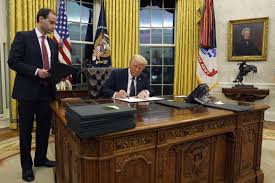
Trump Imposes $100,000 Annual Fee on H-1B Visas; Announces “Gold” & “Platinum” Investor Visa Programs
WASHINGTON, D.C. (September 20, 2025)
In sweeping changes to the U.S. high-skill visa system, President Donald Trump signed a proclamation on Friday, September 19, 2025, that introduces a new $100,000-per-year fee for employers sponsoring foreign workers under the H-1B visa program.
The measure is part of a broader immigration initiative aimed at protecting U.S. jobs, increasing government revenue, and shifting immigration policy in favor of wealthier entrants.
The $100,000 annual fee applies to H-1B visas used by companies to hire foreign nationals for specialized roles requiring at least a bachelor’s degree, effectively raising the cost from existing fees in the hundreds or low thousands to six figures.
The fee is intended to be paid every year during the period in which the H-1B holder is under that status (typically three years, renewable).
Alongside this, the administration has introduced a new “Gold Card” investor visa: foreign individuals can pay $1 million for a pathway to U.S. residency and eventual citizenship, subject to vetting. Corporate sponsorship under this program will cost $2 million.
A “Platinum Card” visa is also being proposed for $5 million, which would allow holders to spend up to 270 days per year in the U.S. without U.S. taxation on non-U.S. income. This program is still in development and requires Congressional approval.
The White House argues that the H-1B system has been abused by companies hiring foreign workers at lower wages and replacing U.S. workers or undercutting wages. The intention is to force companies to decide whether foreign hires are so indispensable that they justify the steep cost, or whether they should instead hire Americans.
Commerce Secretary Howard Lutnick stated that the measure is designed to “protect American workers” and ensure that the visa program is used for “truly extraordinary people,” rather than more routine or lower-skill roles.
The administration also claims that much of the new revenue could help reduce the federal deficit and/or lower other taxes.
Some tech firms and companies depending on H-1B workers have expressed deep concern. The massive increase in cost could severely disrupt hiring, especially for startups or businesses with thinner margins. Payment of $100,000 annually per worker is seen by them as prohibitive.
Universities and other research organizations warn the change could hamper their ability to attract international researchers, faculty, and scholars, particularly in STEM fields where talent is globally mobile.
Critics argue Congress not the Executive has authority over immigration law and fees for visas. They have raised questions about whether the President has the power under existing statutes to impose such a fee without legislative backing. Litigation is expected.
While supporters of the policy emphasize protection of domestic employment and wage levels; opponents warn of damage to U.S. competitiveness, innovation, and loss of global talent.
The new fee is expected to sharply reduce the number of H-1B applications, especially those for positions with lower wages or less exceptional qualifications. Many companies may reconsider sponsoring foreign employees unless the candidate is highly specialized or for senior roles.
Over time, this could drive more outsourcing or relocation of certain functions abroad where labor is cheaper, particularly for less senior roles.
For countries like India and China which together account for a large share of H-1B visa holders workers and companies will likely feel the impact most acutely. The cost increase may alter migration decisions and contract structures with U.S. clients.
Agency rulemaking is expected to come next. The Departments of Homeland Security, Labor, and USCIS will need to issue formal rules defining exactly who pays, how often, what exemptions (if any) exist, and how the fee affects renewals.
Legal challenges are expected to follow, testing the legality of the fee and whether the Executive Branch has overstepped statutory boundaries.
Employers are likely to adapt to the changing landscape, thereby review hiring strategies, possibly reducing dependence on H-1B visas, exploring alternative visa categories, or shifting portions of operations abroad. Startups may particularly struggle.
Countries whose citizens heavily rely on H-1B visas will monitor the effects and may respond diplomatically or seek bilateral arrangements in reaction.
President Trump’s proclamation imposing a $100,000 annual fee on H-1B visas represents among the most significant shifts in U.S. high-skill immigration policy in recent decades. It raises immediate questions about economic impact, legal authority, and international relations. Its effects on companies, researchers, foreign workers, U.S. competitiveness, and immigration law could be felt for years.
As rulemaking begins and court challenges likely mount, how the administration and judiciary interpret and implement these changes will determine their ultimate reach.